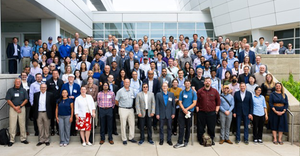Baby's First Recycling Program is Underway
January 1, 2003
Lynn Schenkman
Because an average infant uses approximately 20 to 25 trees-worth of disposable diapers before becoming self-sufficient in the bathroom, potty-trained babies, perhaps, could save rainforests. Diapers aren't just an environmental nuisance to produce. Once in landfills, they may take another 500 years to fully decompose.
With 150 babies born each month, Santa Clarita, Calif., a commuter city 20 miles northwest of Los Angeles, seemed an idyllic spot to test a diaper recycling program. The city selected 500 households to participate in the free, six-month pilot that requires residents to set used diapers on the curb in a bin or plastic bag alongside trash and other recyclables on their regular garbage pickup day.
The diapers are collected on a separate run by Knowaste, a New York-based environmental solutions company, then taken to the company's processor that is capable of sanitizing and separating one ton of diapers per hour. The company already has a successful diaper-recycling program in the Netherlands, where a larger version of the Santa Clarita processor handles up to 100,000 tons of diaper material per year and serves several European cities.
The California demonstration will end in May, when the city will evaluate the program's progress to see if a citywide effort could be sustained and funded. “Ultimately, a nominal fee may need to be assessed to residents,” says Fiona Hutton, Knowaste spokeswoman.
The state of California and the city of Santa Clarita each contributed $250,000, and Knowaste pitched in $20,000 to fund the six-month demonstration program.
“Knowaste is very interested in offering its recycling services to cities throughout California, a state facing surging population growth and increasing regulatory landfill constraints,” Hutton says.
The company estimates 9 million diapers are left in California landfills every day. “We're basically putting human waste into the landfill even though the law says we can't do that,” says Santa Clarita City Councilwoman Laurene Weste.
Santa Clarita is one of the fastest growing cities in Los Angeles County. More than 72 percent of the population is under the age of 44. According to a survey conducted by Texas A&M, College Station, Texas, and Penn State, State College, Penn., 98 percent of households that have babies use disposable diapers. The Santa Clarita demonstration program has sparked interest among other California cities, as well as communities in Germany, South Korea and South Africa.
You May Also Like


